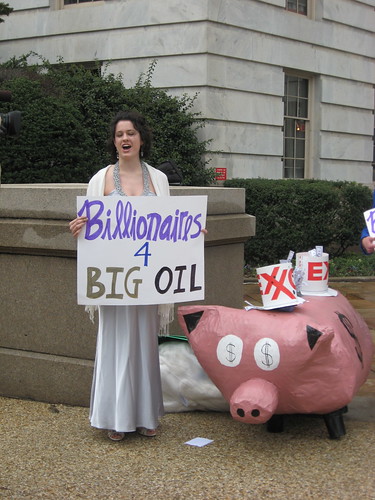Tuesday
Apr012008
tagged  BP America,
BP America,  Chevron,
Chevron,  Shell,
Shell,  exxon,
exxon,  gas prices,
gas prices,  oil and gas subsidies,
oil and gas subsidies,  oil profits in
oil profits in  Pictures,
Pictures,  White House
White House
 BP America,
BP America,  Chevron,
Chevron,  Shell,
Shell,  exxon,
exxon,  gas prices,
gas prices,  oil and gas subsidies,
oil and gas subsidies,  oil profits in
oil profits in  Pictures,
Pictures,  White House
White House 








Oil CEOs Face Congress
By Robert Hune-Kalter-Talk Radio News Service
The CEOs of ExxonMobil, Chevron, ConocoPhillips, Shell Oil Company, and BP America, Inc., the five largest oil companies in the United States, appeared on Capitol Hill Tuesday before members of the House Energy and Commerce Committee fired up by the Gulf Coast oil spill.
Rep. Ed Markey (D-Ma.), the chairman of the Energy and Environment Subcommittee, said he expected the members of the respective oil companies to tell the committee that they believed the incident that occurred with the Deepwater Horizon was an isolated incident.
“It is this kind of blind faith, which is ironically the name of an actual rig in the Gulf, that has lead to this kind of disaster,” Markey said.
Rep. Bart Stupak (D-Mich.) questioned ExxonMobil’s accident response plan because forty pages are dedicated to dealing with media coverage, while only nine represent oil removal. He complimented Rex Tillerson, CEO of ExxonMobil for being well rehearsed.
“I was struck Mr. Tillerson, you indicated in your testimony, based on the industries extensive experience, you state that what we do know is that when you properly design wells for the range of risk anticipated, follow the established procedures, build in layers of redundancy, properly inspect and maintain equipment, train operators, conduct tests and drills, and focus on safe operations and risk management, tragic incidents like the one we’re witnessing in the Gulf today, should not occur, and I mention that because in today’s [Washington] Post, those exact same words are there, but it’s attributed to Kenneth P. Coen, ExxonMobil’s V.P. of Public and Government Affairs,” said Stupak.
Rep. Cliff Stearns (R-Fla.) called for Lamar McKay to resign as CEO of BP America based on what he deemed the poor performance of the company in response to the Deepwater Horizon disaster. Rep. Anh “Joseph” Cao (R-La.) had harsher words for McKay.
“Mr. Stearns asked Mr. McKay to resign. Well, in the Asian culture we do things differently. During the samurai days we’d just give you a knife and ask you to commit harakiri,” said Cao.
The four companies joining BP at the hearing were in agreement that they could not do any better containing the oil spill than BP. They stressed that an incident like the Deepwater Horizon accident can be prevented if certain measures are followed.
“The information we’ve been able to gather suggests that practices we would not put in place were employed here; For example, the casing design and the mechanical barriers put in place, appear to be different than what we would use,” said John Watson, CEO of Chevron.
McKay said that when the two relief wells are completed in mid-August, the flow of oil should be ceased.